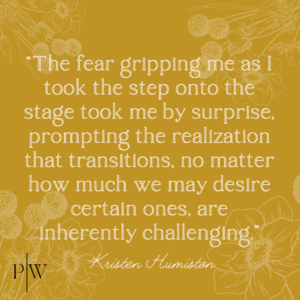I knew it was time.
Even as I maintained the familiar facade on the outside, internally, I found myself inundated with a torrent of intense emotions of anxiety and fear.
With adrenaline and cortisol surging through me, it would seem as if I were preparing for a death-defying feat.
But I wasn’t.
I was simply about to just step back up on a church sanctuary platform.
It’d been four years and 8 days since I’d been even near a similar stage, let alone on the stage leading familiar Christmas songs and preparing hearts for celebrating Christ’s birth.
Despite being on the church platform since I was 4, these reactions felt far from normal for a task I’d performed countless times before.
Have you ever experienced something similar? Something you’d once done or known that came like second nature, suddenly felt completely foreign and frightening?
Transitions are like that. Some are unwelcome surprises, such as the forced church exit we’d experienced. Others are anticipated, natural, and eagerly embraced, like a high school graduation or a wedding following a blissful engagement. Though I had been unexpectedly pushed “off” the stage before, now I stood at a moment where I could willingly return to it.
The fear gripping me as I took the step onto the stage took me by surprise, prompting the realization that transitions, no matter how much we may desire certain ones, are inherently challenging.
Transition seems to be a constant in the lives of pastors’ wives. Whether it’s their own transition or someone else’s, mastering the art of navigating change is an indispensable skill for a pastor’s wife, yet it’s a topic few seem to prepare us for!
Webster’s online dictionary defines transition primarily as “a change or shift from one state, subject, place, etc., to another.” What intrigued me were the supplementary descriptors in subsequent definitions: “a period or phase,” “a segment connecting,” “typically involving a loss or gain.”
These phrases bring to mind an important term that often goes overlooked: Liminal.
Liminal denotes the space between two other spaces; it’s the threshold between what currently exists and what will come next. It’s the interim phase between two other phases, one that has passed and one yet to come.
What liminal spaces have you experienced in your life? How did you relate to others and God during that time? What emotions did you feel?
Henry Cloud, in his powerful book Necessary Endings, reminds us that necessary endings usher in beautiful beginnings. He notes all things must come to an end, and then there is a gap period before the next thing, and then the new thing begins. This “gap period” is rife with uncertainty, inviting anxiety and fear simply because of its innate unknown nature.
Reflecting on the challenges and periods of uncertainty in your own life, how many of these occurred within the liminal space as you awaited the next phase?
A couple of years ago, I began to delve into the concept of liminal spaces, and since then, I’ve found myself continuously reflecting on the liminal moments in Jesus’s life. From the anticipation between the joyous leap in Mary’s womb and His birth, to the years following His early teachings in the synagogues until He declared His public ministry almost two decades later. There’s the interval between His mountaintop baptism, where He heard His Father’s voice, and the solitary journey into the desert just hours later (and the subsequent 40 days). Even throughout His three years of ministry, every moment seems to be part of a larger liminal space as I think on the fact that all of Jesus’s earthly life happened in a liminal space when viewed in light of God’s broader redemptive story – from the Old Testament days pre-Christ’s birth, to our current age, when we now look back at the cross as the source of our salvation, rather than looking forward as our brothers and sisters of old.
Jesus knows liminal spaces.
Jesus, the Word made Flesh, dwelled among us in a liminal space spanning about 33 years. He was God moving amidst humanity, He was God with skin on, revealing His profound love—so profound that He chose to depart from the presence of His Father and enter this world, often described as “a dungeon” by one of my favorite authors, Diane Langberg. Scripture says, “He who knew no sin became sin for us, that we might become the righteousness of God” (2 Corinthians 5:21).
Jesus stepped into the liminal space so that He could bring hope to change all transitions from there forward – to provide us comfort and peace when we experience all the inevitable transitions life brings and to forever change our ultimate transition – when our soul leaves this earth and is united with Him and His people in heaven when our day is marked out for us.
I’m incredibly privileged to work with pastors’ wives and ministry leaders, especially during some of their most isolating, dark, and painful liminal spaces. In these moments, anxiety often replaces peace, and joy feels elusive. As I journey alongside these precious women, I witness them earnestly seeking God, pressing into Him more deeply as they grapple with inevitable questions that arise during prolonged liminal periods. They long to hear from God as they once did, often through prayer and the reading of His Word, yet they find their efforts to connect with Him in these ways falling short.
Observing these liminal spaces in others’ lives and reflecting on my own brings to mind Jesus in the Garden of Gethsemane. He prays three times for God to “take the cup,” revealing his desperation. Jesus, the Word made Flesh, himself pleads to avoid something he clearly knows he must endure—and we’re left uncertain of God’s response. Was it silence? We can’t be certain. There’s no indication of inner peace during this prayer; otherwise, Jesus wouldn’t have repeated His plea three times.
Yet it’s precisely this uncertainty that brings me comfort. Even in the midst of His own liminal space, just moments before His crucifixion, Jesus persisted in asking, praying, and leaning into God.
Isn’t it comforting to know that just as we need to hear God’s voice – some word from Him to help settle our soul – Jesus did, too?
Despite the discomfort and tension that accompanies the unknown, liminal spaces often draw us into silence and stillness. It’s in these moments that God often does His deepest work, speaking to the quiet depths of our hearts.
If you find yourself in the midst of a season or a liminal space, feeling as though God is distant or unresponsive, perhaps reflecting on Jesus’s life in these liminal moments will bring you comfort as well.
In the enigmatic tapestry of life’s transitions, let us take heart in the assurance that just as Jesus, the Word made Flesh, traversed the liminal spaces of his earthly journey, so too does He journey with us, speaking into the depths of our souls, guiding us through the unknown with grace and love.
Stepping back onto the stage, fear palpable within me, I played for One. Throughout that 30-minute set, I felt God’s presence with me in a tangible way. Transitions may be challenging, but it’s His presence amidst them that empowers us to navigate with greater confidence. May you feel His presence in your transitions, whether or not you can physically open the Bible in those moments. May you find solace in the presence of the One who embodies the Word, and may the Holy Spirit bring comfort when former ways of connecting with Him seem out of reach.
Taking it Further:
What liminal spaces have you experienced in your life? How did you relate to others and God during that time? What emotions did you feel?



Interesting perspective. Thank you. You have given me something to mull over this week.